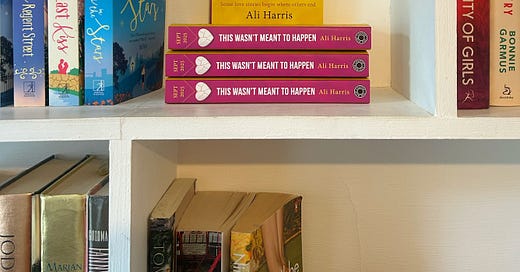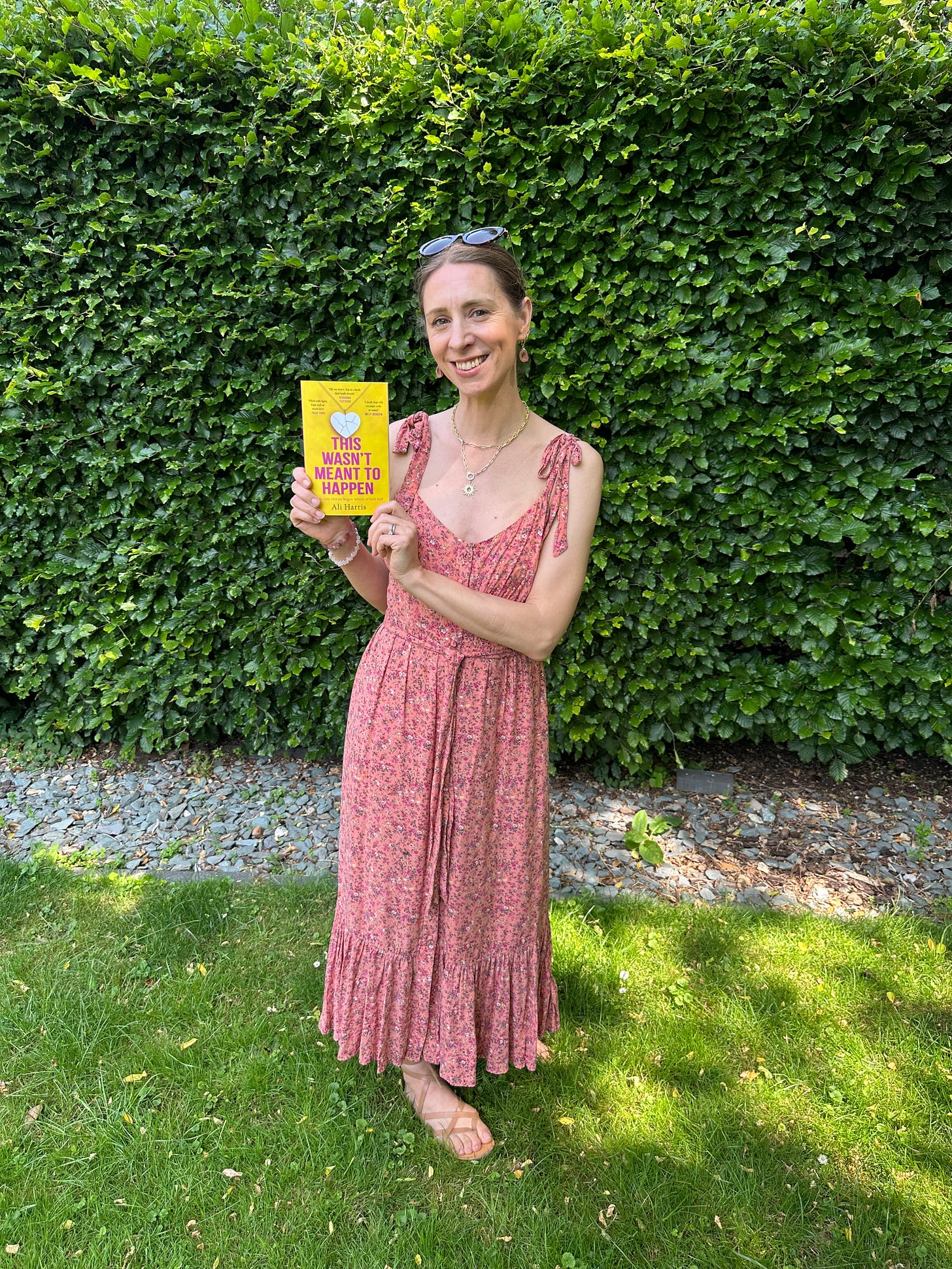The book I needed after baby loss
How grief stopped me from writing - and eventually, led me back to create the story I couldn't find on the shelf
I didn’t set out to write a novel about baby loss. On the contrary, in the years after Poppy died, I couldn’t write at all. It was just too painful.
For the first time in my life, I felt unable to believe in - let alone write - a happy ending. How could I successfully steer a story arc when mine had spun so spectacularly off-track?
I was a writer who couldn’t write. It was like one of those nightmares where you try to run but your legs won’t move - except it wasn’t my legs, it was my fingers and my brain. The tools I had always relied on to process life just… froze.
However, in those early weeks, there was so much I couldn’t do (get out of bed, leave the house, see people, stop crying) that I barely noticed. My first clue was realising that even texting or emailing someone to tell them my baby died was impossible. Hearing it myself was horrific enough. I didn’t want to have to repeat it.
“I was a writer who couldn’t write.”
So, like Sofie in This Wasn’t Meant to Happen, I mostly let my husband share the news. There were simply no words available to me.
The first words
After a few weeks, I started a series of six free counselling sessions with a wonderful baby loss charity called Petals. My counsellor gently encouraged me to write about my experience. She felt it might be helpful to process it in this way, especially when she found out it was what I did for a living. I point-blank refused.
The one exception came in my final session. I’d been talking about how confused I felt about whether I could - or should - try for another baby one day. She handed me a piece of paper and asked me to write, just for one minute, what was in my head. No one except her would read it, she promised. I didn’t even need to keep it.
Reader, I filled the page in seconds. A grief-stricken, sprawling tangle of thoughts, fears, trauma and impossible hope. It was like sleep-writing - direct from somewhere deeper than my conscious brain.
Looking for something that couldn’t be found
I spent those long days in that first year either after Poppy died looking after my two children (age 6 and 4 at the time) or, when they were at school, trying and failing to find ways to both deal with and distract myself from my grief.
In the second year, feeling like it was time, I returned to the novel I’d been writing before I had Poppy. It was a dual-timeline story set on Broadway, full of dreams and dancers. I had written 70,000 words whilst pregnant and believed it was my best book yet. When Poppy died, my publishers were wonderfully supportive, extending my deadline and pushing the publication date back as much as they could. But I had a contract, and I wanted to fulfil it. It was time to get back to what I loved. Besides, who was I if I wasn’t a writer?
“I couldn’t find myself or my story in fiction.”
I tried so hard to lose myself in it again. But it quickly became clear that I wasn’t the same person who had started that story. After completely breaking down one day to my husband, I decided to pay back the book advance. Escapism wasn’t an option - not writing, not reading. I couldn’t find myself - or my story - in fiction.
I’ve since wondered if it was that I couldn’t find Poppy there.
Running, not writing was where I found her. Through fields and meadows, in sunshine, wind and rain - even snow, I always felt closer to her outside. It was on a run when an idea came. A five-word title that I wrote into a notebook when I got home… and then put away in a drawer.
Another year went by, and, as I said in my previous newsletter, we were lucky enough to have a baby boy. I spent the subsequent year with gratitude and bliss as welcome company to my grief. When he turned one, the clouds parted completely and began to form into words in my head. A story to go with the title I’d written in the notebook before I became pregnant and that I’d since found buried in my desk drawer.
Writing the book I needed
In the four years since Poppy had died, I realised that I’d been searching for a book that reflected my experience. I had read, valued and felt supported by so many personal stories in the non-fiction books I’d read about grief and baby loss, but that was their story. And I’d found very little of it in the place I have always looked for answers about life, love, the world and the universe - novels.
I was looking for one that didn’t sugar-coat, stage-manage or sentimentalise loss for the sake of the story. I wanted to read a love story that was shaped by this kind of grief, not defined by it as a tragedy. And yes, there’s a difference. The latter makes the death the highest arc of the plot, but with the first, it’s hope.
I wasn’t looking for answers in a story (I knew there weren’t any). I wanted to feel seen and carried. Not fixed. Not “healed.” Just… understood. I knew that there must be many other women - women like me, who had been on a similar journey and who might feel the same.
I couldn’t find it. So eventually, slowly, tentatively, quietly, I began to write that story myself.

“If there’s a book you want to read, but it hasn’t been written yet, then you must write it.” - Toni Morrison
Writing this book was both the easiest and hardest thing I’ve ever done. I wrote it chronologically, starting with my main character delivering her stillborn son. I believed (I still do) that the reader deserved to know exactly what the book was about from the first page. I also knew that nothing would be harder to write than that scene - a scene which so many baby loss mothers never get to share. I wanted to put Sofie’s to the page so readers could really understand the nuance of this experience; and maybe even visualise the babies that exist in the hearts and heads of those who love them, and who often, never get asked about them.
It remains the writing I’m most proud of. Whilst writing those first few hundred words of a book - my first in five years - I soon realised I would be writing this entire book from a different part of my brain. The very same part that had written that single page of grief-stricken words for my counsellor years before.
Not consciously, but congenitally.
The where, when and how
This Wasn’t Meant to Happen was written in the snatched pockets of time between school runs, during early mornings before the house woke up. It was written amongst the chaos of real life - noise, messiness, tears and tantrums (both mine and the kids) - constant interruptions and then, the small matter of a pandemic. As a result, the first draft of the book was messy, really messy.
I wrote close to 300,000 words to get that first draft. There were many different versions of the same scene; different versions of the ending and an endless variety of difficult, hopeful and just plain painful moments in Sofie and Rory’s grief journey. There were other characters. More women. More babies. To be honest, I could have written the book forever. I had the opposite of writer’s block. Once I’d started, I couldn’t stop. There weren’t enough words in the world for something that is experienced by thousands of people every day, all over the world, and who I desperately wanted to honour.
Writing during lockdown when the schools were closed and I had three children at home and a husband constantly on Zoom felt, at times, nigh-on impossible. I wanted to keep going because I knew that there were now women experiencing baby loss alone, in total isolation.
So I kept writing, in snatched moments between Rex’s nap times and the kids’ home-schooling. I even wrote it at my bedroom dressing table when Rex and I were isolated from our family for a week, desperately typing between picture books, jigsaws and Disney films.
It was strangely therapeutic. Covid was a reminder in real time that we can live through something hard and survive it. And that there are always moments of beauty, love, resilience, clarity and hope to be found within the most difficult of circumstances.
By then, nearly six years had passed since Poppy had died, so writing this novel wasn’t as painful as readers may expect. I wasn’t writing a memoir. I didn’t have to relive events exactly as I’d experienced, but channel the raw, remembered emotions that were etched into my being into something meaningful and relatable and also, I hoped, beautiful.
“Covid was a reminder in real time that we can live through something hard and survive it.”
In those six years, I’d made space and time to process my own grief and make Poppy a part of my daily life. And, in the eighteen months that I’d been writing the novel, my protagonists, Sofie and Rory, had fully come into existence in my head and heart. This was theirs and Leo’s story - not mine and Poppy’s - which for me, meant it was for everyone. That is the power of fiction - to reach people beyond the community that a story is directly about. It was this that drove me on to the end. When I finally wrote those words and then shared it with my agent in 2020, she said she said it was unique, beautiful and powerful. It gave me hope that one day, this book might find those readers.
But as any writer will tell you, the end of the first draft is never actually the end. My agent was incredible; she gave me enormously passionate and compassionate editorial notes. I went away and I worked hard to gently, patiently and doggedly find the strongest strands of that first draft and pull them out of the many knots I’d written. I did that for the second, the third and - I think - fourth draft. That took 18 months. We finally submitted it to publishers in March 2023 - four years after I’d started writing it.
And then… well, that was a whole other difficult journey - one which I’ll save for another newsletter!
Two years on, and with twelve weeks to go until publication I know that This Wasn’t Meant to Happen is exactly the book I was meant to write. It was the book I needed but couldn’t find, and I hope that means many other people will be looking for it too.












Wow—what a stunning and deeply moving post. I’m so sorry you had to endure the heartbreak of stillbirth.
After falling in love with Written in the Stars, I was eagerly awaiting any news of your next book. It makes so much sense now why you stepped away—I often wondered where you had “disappeared” to. I completely understand why writing was impossible during such an unimaginably difficult time.
Thank you for sharing your story with such grace and honesty. I'm looking forward to reading This Wasn't Ment to Happen.